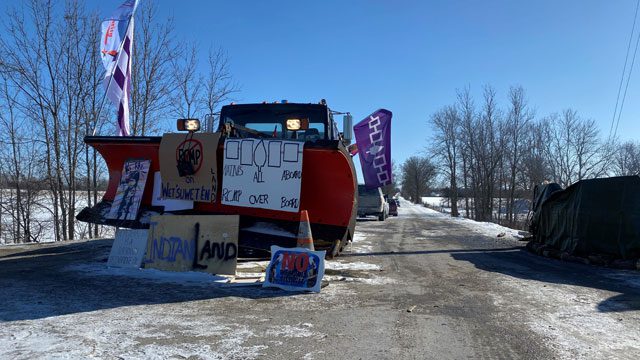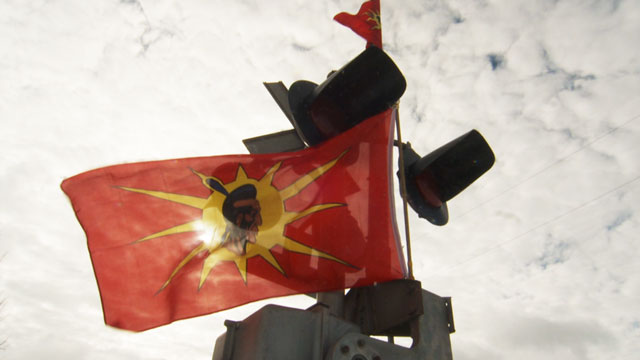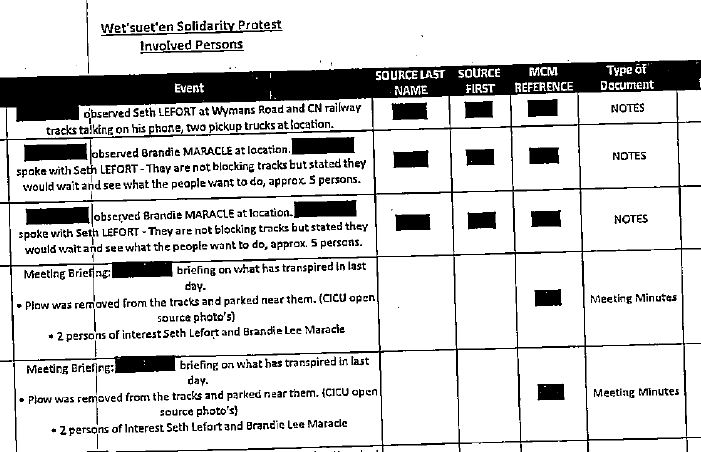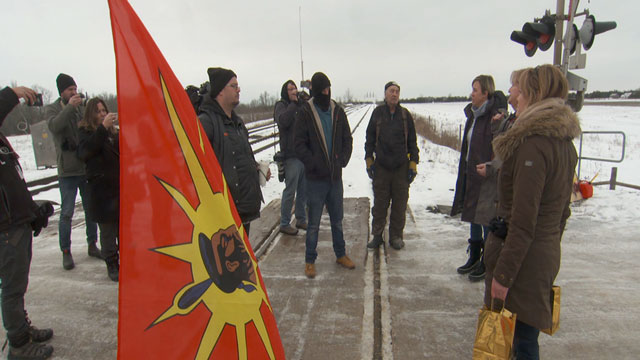
This photo taken Feb. 14 shows the dump truck, with the snow plow, not blocking the tracks. APTN photo

Ontario Provincial Police gave up too much information and rolled over too easily when it provided the Canadian National Railway a list of names and intelligence on land protectors involved in the rail demonstration near Tyendinaga Mohawk Territory says a former Ontario attorney general.
In fact, it leads the public to believe the courts are “hardly … an impartial system” said Michael Bryant, now executive director of the Canadian Civil Liberties Association.
“It’s not in the public interest that the OPP get used this way. Private citizens and companies can’t use the police in this way,” said Bryant, who was attorney general from 2003 to 2007.
APTN News reported Wednesday that the OPP said it first refused to provide the information to a CN Rail lawyer, who wanted the names of the Mohawks to seek a civil remedy against them for violating a court injunction.
The railway then said it would subpoena the force’s provincial liaison team (PLT) officers who had been meeting with the Mohawks daily once the demonstration began on Feb. 6.
Instead, it was set-up by the OPP that Staff-Sgt. Chris Watkins would be subpoenaed by CN, because he is not on the PLT.
Watkins arrived to court on Feb. 14 with a three-page document entitled: Wet’suet’en Solidarity Protest/Involved Persons.
“I think they ought to have sought to have that subpoena be quashed,” said Bryant.
The OPP said it didn’t believe there were grounds to fight the subpoena.

(A portion of the document provided in court that was redacted by the OPP. The two community members named in the document were previously identified by APTN. Their dates of birth were purposely left out by APTN.)
The document is a table chart of each meeting between the PLT officers and the Mohawks providing the date, time, name, date of birth and a description of what was discussed based largely on “incident command notes.”
One of the notes was between the officers and the apparent leader of the demonstration Seth LeFort on Feb. 10 at 11:41 a.m.
It is written below as it appears in the document.
“PLT met with Seth LEFORT to discuss injunction – tension was high. Seth stated ‘if we don’t get 2nd veh out”… PLT not wanted back, come back tomorrow. Seth was very curt and sharpe. Very clear no trains will be going through. Lots of firewood dropped off, there will be a smash up and blood on the tracks. 10-12 people present. Wood was dropped by Nissan Van. Seth stated he didn’t want PLR attending every 3 hrs has it escalates the situation,” the note states.
Another note reports on Feb. 9 the “group dynamic have changed and they seem to be more aggressive.”
The notes also show authorities were on the group quick as it reports LeFort was seen talking by the Wyman road rail crossing at 10:53 a.m. Feb. 6. Four hours later the demonstration officially began.
There are over two dozen different entries.
“They are not just getting the identities of people. They are getting information that they otherwise would never be able to get and should never get that amounts to a police investigation,” said Bryant.
In total, at least nine different people are identified and provided to CN to pursue a “civil remedy” against the land protectors. There are others on the list but appear to have been crossed out with a pen, yet are easily readable.
According to court documents, CN is seeking to find the people identified in contempt of court on March 24 for violating the injunction to vacate the demonstration area issued Feb. 7 by Justice William Chalmers.
Chalmers extended it indefinitely Feb. 14.
It wasn’t until Feb. 24 that the OPP executed the injunction arresting 10 people at the demonstration who have been charged with various offences, including mischief and resisting arrest.
But those charges are criminal.
What the OPP gave to CN can be used in a civil matter to possibly seek a financial penalty against the land protectors.
“I am astounded to see the OPP voluntarily sharing the fruits of its investigation with CN,” said John Phillips, a lawyer in Toronto who is familiar with the issues.
“The OPP met with, and purported to be working cooperatively with, the protesters in good faith. Handing over the information they obtained to CN, a corporation seeking to pursue their private interests against the protesters, totally undermines the work done by the OPP and any progress made. Worse, it endangers the effort to maintain public peace and safety during this unsettled crisis. The situation is incredibly disappointing.”
Phillips also questioned what it means going forward for the OPP.
“So, next time, will the OPP, on a simple request, share the details of its investigation with parties in other lawsuits, or is it only when a large corporation with its own private police force is involved?” said Phillips, adding CN has its own police force.

(OPP liaison officers, right, meet with land protectors during the rail demonstration Feb. 11.)
Bryant compared the situation to another private matter.
“If I am in a family law dispute I can’t get the OPP to come testify against the other side because it serves my purposes. The police are not going to do that. They are not going to get involved in a private dispute. They are not going to hand over intelligence, whatever they have. That’s police work that they are handing over,” he said.
Chalmers was also critical of the OPP in his Feb. 14 order for not enforcing the injunction.
“I am concerned that the police have failed to take steps to enforce the injunction order when it became clear that the protesters would not abide by the order. The OPP reportedly left the site after witnessing the burning of the order. No steps have been taken by the OPP to arrest the protesters or take any other action to ensure that the order is complied with,” wrote Chalmers.
“It seems to me that if the police have the names of the persons in breach of the order, the police are obligated to charge those persons. If the police are not prepared to do so, at a minimum, the police should provide the names to CN Rail so it can pursue a civil remedy.”
Chalmers confirmed in his order that the OPP knew what CN was planning to do with the list of names and the intelligence.









